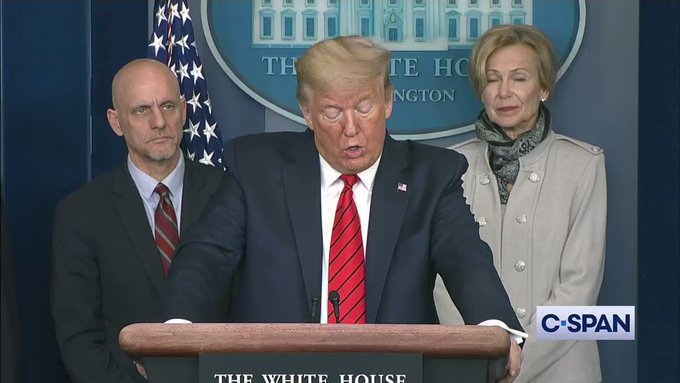Self-Medicating Against Novel Coronavirus Infection
"You should not take medication without the scientific evidence. These drugs are not without side effects. In fact, they have quite significant side effects."
"People have to be really, really careful about this. Don't do it."
Dr.Theresa Tam, chief public health officer, Canada
"There is the odd study that says these compounds could help, but there are just as many that fail to show any benefit and others that go the other way and suggest potential harm."
"Absolutely, it should be studied in a randomized trial, I have no problem with that. But the idea that people should start taking chloroquine because it's a game-changer, I think is just nuts, frankly."
"[The pills might be used as] salvage [therapy when doctors have nothing left.] But frankly, the probability of it being useful in that situation is extremely low, slim to zero."
Dr.Anand Kumar, critical care doctor, Winnipeg Health Sciences Centre
"It would be much better if the government could come up with a policy that said, for dying or severely compromised patients we will try some agents and we'll do it in an organized manner so that we can figure out if anything helps and we don't cause a slew of unexpected side effects."
"[The data from China is hyper-weak and] pouring zillions of pills into the world's population achieves nothing but risking side-effects, at present."
Dr.Arthur Caplan, head, division of bioethics, NYU Langone Medical School
 |
| Researchers at the University of Minnesota work with coronavirus samples as a trial begins to see whether malaria treatment hydroxychloroquine can treat COVID-19, March 19, 2020. |
Out of the mouths of those with no expertise in medicine, much less bioscience, comes a statement, ill-considered, presumptuous and impetuous, reflecting the style of the man. "Game-changer" is what U.S.President Donald Trump said of flimsy evidence relating to the use of old drugs formulated against malaria now being touted as a medication capable of neutralizing COVID-19. This casual statement flung into the ether to be absorbed by the impressionable, while the U.S. top infectious diseases adviser, standing nearby, shudders in dismay.
 |
Since then, there has been a run on the drugs; two old anti-malaria medications, hydroxychlornoquine and chloroquine. Far from the United States, in Nigeria, two people overdosed on the drugs that held "tremendous promise", leading Lagos State health authorities to warn against the massive consumption of the tablets chloroquine and hydroxychiotoquine. The situation is giving rise to well-founded concerns that hoarding of the pills could begin. President Trump on Hydroxychloroquine: "It's been around for a long time, so we know if things don't go as planned it's not going to kill anybody...It's shown very, very encouraging early results, and we're going to be able to make that drug available almost immediately."
And it wouldn't be the first time, as evidenced with the anti-viral Tamiflu during the bird flu scare that took place in 2005, when people began to self-medicate. The situation is so desperate with no reliable medication yet identified that would be useful in curtailing the spread of the coronavirus that a million doses of hydroxychloroquine is set to be donated to Canadian hospitals by JAMP Pharma Group of Quebec with the company describing its offer with a dual purpose; making the drugs available to people hospitalized with COVID-19 while avoiding a shortage for people whose medical condition otherwise requires them for survival.
Hydroxychloroquine is a common generic drug used in t he treatment of lupus and rheumatoid arthritis. Lupus representative groups have reported that people are facing problems filling their prescriptions resulting from President Trump's 'exuberant' pronouncement. Furthermore, lupus sufferers are immune-compromised placing them at greater risk of contracting COVID-19. And while both drugs show activity with the virus causing COVID-19 in vitro (tissue cultures) some papers suggest viral replication can be increased in the presence of the drugs.
"That is to say it can hurt you potentially", advised Dr. Kumar of the Winnipeg Health Sciences Centre who is trained in infectious diseases. Meanwhile the drug is being used on hospitalized COVID-19 patients on an "uncontrolled basis" in a number of countries including the U.S., according to the U.S. Centers for Disease Control and Prevention; one of several drugs under investigation in a mega-trial sponsored by the World Health Organization.
 |
There are many unanswered questions about the drugs; dosage for one thing, and safe tolerance for the frail and the sick. Several randomized controlled trials are taking place in Canada as well as testing whether the drug might prevent infections in frontline health care workers. According to one theory, the drug may reduce a cytokine storm as when the body stimulates the immune cells to produce chemicals to counter a viral invader.
The danger being that over-stimulated immune cells may turn on themselves in a destructive frenzy. The drug Remdesivir, produced by Gilead Sciences in the U.S. has been given to hundreds of infected people in the United States, Europe and Japan, reflecting an emergency access protocol. The result of which has flooded the pharmaceutical's capacity to produce the numbers being called for through the company's emergency treatment access system.
Labels: COVID-19, Malarial Drugs, Self-Treating, U.S.President Trump

<< Home